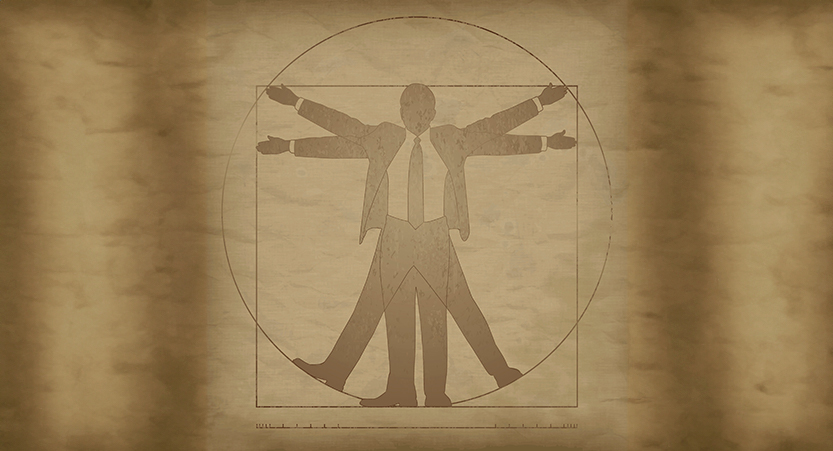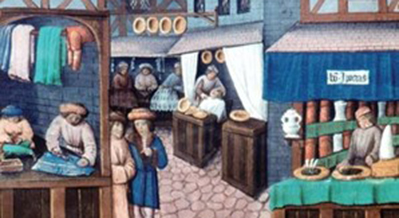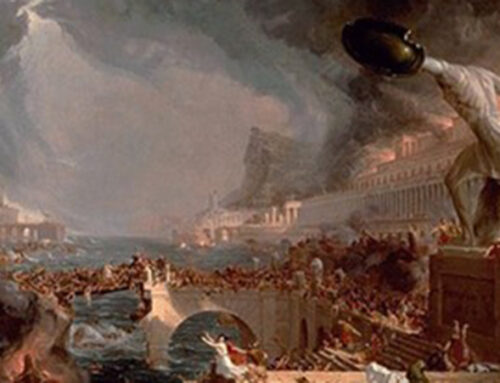“Invent the Future” – Stop reacting and restart Inventing the Future, as the ancestors of the Renaissance did to recreate civilization.
Businesses are fighting forces that led to the fall of the Roman Empire and existed in the Dark Ages including political chaos, government corruption and inefficiency, government taxation and regulation, devaluation of currency, crime, workforce quality and scarcity and accountability issues, supply chain challenges, geopolitical threats, pestilence and disease, and the invasion of the U.S. southern border. Business Renaissance Article 1- Introduction
These forces bring significant impact to business existence, operations and profitability, and growth, and have escalated in the past four years. Many small and medium businesses are downsizing and consolidating, being purchased by larger and multinational companies, moving manufacturing, and more because they don’t have tactics and a plan to weather the storm, survive and grow.
In business meetings or events, these forces and risks are the “Elephants in the Room” and not discussed, let alone acted on. Businesses move forward without a Tactical Plan to execute strategy and address issues and risks. They don’t fight back and “Invent their Future”
The Renaissance provides a vision, model and plan to create a new future.
Education and Work Force Development and IP and Infrastructure- Renaissance Roadmap
Business Renaissance Article 1- Introduction described Petrarch’s and the humanist’s contribution to the Renaissance. They transformed the world by reviving the knowledge, arts, and moral philosophy of ancient Rome and Greece. Petrarch and the Italian humanists, created the educational program called the studia humanitatis (or “the humanities”), consisting of grammar (Latin), rhetoric (persuasive speaking), poetry, history, and most importantly, moral philosophy. Petrarch revived education developed by Greek philosophers. (“The humanities” was the foundation of American Education until the 1980s. Now there is not a remnant left in many states. With this loss has gone workforce capabilities.)
The humanist
- Created a new form of education. Start new types of schools. Returned to the humanities on which western civilization was built. Education
- Revitalized the knowledge and understanding of human dignity, the power to shape our own lives, and the knowledge that human beings (not artificial intelligence) can create great works and innovation. Work Force Development
- Revived knowledge, arts, and moral philosophy of their predecessors. Searched for and found lost books, manuscripts, and documents. Systems, Infrastructure, Knowledge, Understanding and Wisdom
Although this may seem beyond Business purview, it is not. Lack of a basic, foundational education is impacting most employers. So too is the inability of employees to self-start, take initiative and function effectively in the workplace and grow in their careers and responsibilities. In addition, the information and understanding that applied to business Intellectual Property and systems are crumbling or lost.

Renaissance Humanist Roadmap
- Education
In the past 10 years many private schools have been incubated and are flourishing. More and more parents are choosing to home school. Classical (Humanities Based) curriculum is used in or available to these schools and parents, including some at no cost. Business can and are supporting or partnering with independent schools with a classical curriculum to develop and nurture future employees. Educators and businesses have developed partnering programs, for example MECOP and Greater Spokane Chamber of Commerce.
- Workforce Development
Over 30 years ago, business took a role to educate employees after high school or formal academic degrees. Examples included IBM, Westinghouse, Ford Motor Company, Precision Castparts, and many others. At Ford I learned to use a scanning electronic microscope, at Westinghouse how to program and write technical papers, and at Precision Cast Parts about Statistical Process Control.
Business training and mentoring nurtured employee development and enabled and encouraged them to create and innovate. The programs provided opportunities for advancement forward or growth within a discipline or role. Most of these programs were eliminated. Why?
Today Dr. Ed Schweitzer and Schweitzer Engineering Laboratories (SEL) Laboratories have developed enhanced learning programs, in house. Please respond, or send email, with other companies who have developed exemplary education, training and mentoring systems.
- Systems, Infrastructure, Knowledge and Wisdom- Business Intellectual Property
Preserving and continually improving Intellectual Property (IP) and systems is the foundation of a business. Business IP consists of inventions, designs, products, services, and systems including infrastructure, programs, processes and procedures. In many organizations, IP and business systems have deteriorated or been lost. In some cases, IP was not documented and or sustained through training and improvement. With retirements and high employee turnover in the past 4 years, the impact of this lost knowledge and understanding is eroding the effectiveness and profitability of businesses.
A few case examples from colleagues and clients are symptoms of this problem.
- Customer sends RFQ to existing PCB/ EMS supplier. Five week later they responded. The supplier blamed it on an IT implementation. The Customer Services Manager never followed up with an email or call in between. In the meantime, the Customer found another supplier.
- Home improvement store retail employee is asked by a shopper (me) where to located a product in the store. The employee searches in her/his cell phone to locate it. After 5 minutes, the shopper gives up, walks around a post, only to find the product within 10 feet of the employee.
- Manufacturer delivers defective product to Customer due to uncontrolled manufacturing changes including a move to different location. Customer reluctantly established alternative off shore supplier.
- Large publicly traded company mandates Covid vaccine. New Product Development team members choose to leave. New employees are hired but it takes 2 to 3 times as many of them to re-engage and move forward on the project. Documents and records are lost and they have to ask the supplier development partner to send documents and records and update their team.
- After years of no findings by an ISO 9001 Registrar, leadership is suspicious and calls for an independent audit. Processes and procedures are not complete or up to date and training not conduced. Employees are functioning on tribal knowledge or documents they created to fill the gap, left by a Quality Manager.
And then there is the recent Boeing examples. Erosion of Boeing IP and business systems over a 20 plus year period came to catastrophic events in the past year.
Documented IP including systems, processes and procedures are imperative to sustaining and growing the organization and relatively easy to accomplish. Still many small and medium size businesses operate on some tribal knowledge. Larger corporations tend to make the opposite error of creating too much cumbersome bureaucracy, to the point employees do not follow standard processes.
Renaissance Merchants, Crafts and Business Roadmap
Business Renaissance Article 1- Introduction generally describes the contribution of Merchants, Crafts and Businesses the Renaissance.
Organization and Assumption of Liberty- The merchants and crafts organized themselves in towns, created supply chains and shipping/ transportation services and protection services. They did not wait for government to take the lead or give them approval, charter, or hand up or a “grant”. They understood and assumed their freedom. They refused to let government take control. They said No.
- “The new urban communities could not be contented in a society regulated by feudal and manorial custom. From the early time when professional merchants began to travel the highways they were recognized as a unique group, governed by their own customs and entitled to special protection of princes and kings. They had long managed their own affairs, settled their own disputes, organized to caravans for traits, and protected themselves when feudal lords could or would not protect them. They had never been touched by the legal disabilities of serfdom. They would tolerate no personal limitation, no restriction of freedom of movement that their business demanded.”
Liberty and Local Governance- They expanded these liberties and expanded to their colleagues, the community. They established their own governance and local autonomy.
- “When a considerable group of merchant traders and artisans permanently settled on the land they confronted feudal society with a serious problem. The merchants expected to retain all their privileges, which they sought to have confirmed for themselves and extended to include their local colleagues, and then large to take in the whole non-agricultural community. The more advanced of the new group soon held that they should govern themselves, judge themselves, tax themselves, defend themselves; in other words, that they ought to have complete local autonomy.”
Trade to Reshoring- They Reshored
- “In exchange for Eastern imports the West had to export either raw products or manufactured goods. The importation of the products of the Eastern industry furnished models and an incentive to Western craftsmen, and the profits of Eastern trade began to furnish capital for the development of Western industry. In many lines the West had to make goods formerly imported from the east – textiles, draperies, carpets, furniture, enamels, and glass. Western products soon equaled Eastern products in excellence. Finally, they surpassed them and drove them off the Western market.”
- “The Italian towns took advantage of the struggle between the Emperor and the Pope to establish themselves as independent merchant republics. Every object of the town was the same: freedom from serfdom and all its entanglements. The town was to have freedom of movement, freedom of trade, and freedom to marry, without any interference. The townsman also had complete freedom in the disposition of his land and property. In some instances, especially in northern Italy and along the Rhine River, the towns had to resort to violence to secure their demands. Often, they took advantage of the Ruler’s lack of money to establish their charter of liberty.”
- “The Merchant and Craft Guilds formula started as a first is a voluntary organization of individuals engaging in the same pursuit and formed for mutual protection and advantage. Eventually they adopted the policy to monopolize, to exclude from the local market so far as possible and to penalize both the outside and the independent trader who was not a member of the Guild. The purpose of the Guild included restraining the initiative of more the more enterprising members; to guarantee the consumer wears of good and uniform quality; and to establish a system of industrial education. No foreigner was permitted to practice a trade in a town without becoming a member of his craft Guild. The guilds themselves fell more exclusively into the control of richer members, who aim to restrict them to their own families.”
It is time for a Renaissance in business. Recap
- Understand the importance of your small to medium sized business and your power to make change and “Invent the Future”.
- Develop internal education and training, workforce development and mentoring programs.
- Support K-12 independent education programs, particularly classical humanities.
- Document your IP and business systems, infrastructure and processes in a form that facilitates training, implementation and improvement.
- Form partnerships of with other businesses including Customers and Suppliers. Realize your strength as a partnership, create a strategic and tactical plan focused on a few targets, and fight to ward off government, tax and regulation, etc. and improve your community.
- Create new supply chains and shipping/ transportation services. Evaluate and implement reshoring or near shoring including to your business partners.
- Politely resist government regulations. Refuse government intervention. Regulators will often cave if they meet resistance.
- Adopt best business practices and optimize operations, productions, quality and delivery. Assist your business partners in improvements.
- Capture the freedom to create, and innovate, goods and services, and grow.
Cost Benefit
What are the benefits of an employer taking responsibility for employee education and workforce development? What about documenting and sustaining IP? What about forming business alliances and partnerships? In Article 3, we will provide the cost benefit analyses and case examples for some of these programs.
“One of the reason small businesses create most of the innovation and new wealth is because most owners are entrepreneurial in spirit. They are most often driven by a cause and purpose to “change the world”! These folks are visionaries and commit copious amounts of financial resources, time, and effort as they attempt to look into the future of unknown possibilities and peril. Often their passion causes them to not fully recognize and understand the risks, so to mitigate them, as they move forward with their dream. This is the reason innovators sometimes create superior technology that the market does not value. Whereas many small businesses fail within the first two to three years the ones that survive can stake their claim to new technologies and wealth creation.
In order to help business Renaissance expand, small and medium sized businesses and entrepreneurs must be shown how to grow innovation using risk mitigating tools and concepts. The goal is to increase the success and speed to market of businesses so to bring their purpose and cause to a long life of growing wealth within a free market, capitalistic system. “ Larry Martin- Oregon State University College of Business
How can we help?
The Mervyn Group partners are passionate about helping businesses thrive under what have become harrowing conditions. We are ready to assist in reviving and optimizing your business, and/ or potentially creating your own Renaissance business. We
- Have experience in large and medium sized companies during their heyday, when business best practices, classical education, and knowledge and understanding were the foundation of a company.
- Led the large and small businesses of excellence of the recent past were at their peak.
- Know the best business practices and foundational knowledge. Utilized that knowledge and experience and played instrumental roles in optimizing operations, manufacturing or service, and delivery in all types of companies.
- Provide full lifecycle services.
Our background, approach and leadership are grounded in technical and engineering disciplines. We bring this experience into every project, along with our business management expertise.
We will help you create a plan to achieve your vision without compromising your values. We will help you evaluate and partner with you to quickly implement solutions and sustainable improvements to achieve your vision, mission, goals and objectives.
To Learn More Contact Debra Mervyn- Debra@MervynGroup.com






